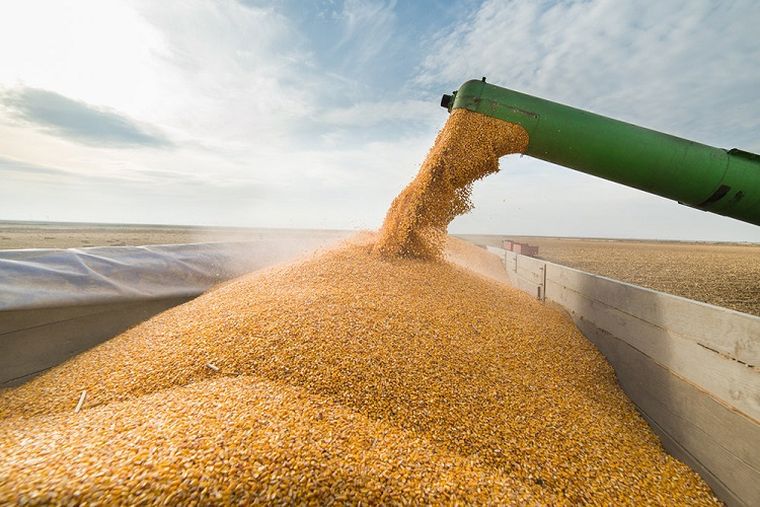US launches initiative to support Ukrainian farmers hit by Russia’s war

The Biden administration is putting $100 million into a new program to provide Ukrainian farmers with vital supplies in order to maintain future harvests and alleviate the global food security crisis that has been exasperated by Russia’s war on the country.
Some Ukrainian farms have turned into battlefields, and farmers who have maintained their harvests have been unable to get machinery and other key supplies including fertilizer, seeds and storage bins that would typically arrive through Black Sea ports due to Russia’s ongoing blockade of Ukrainian ports. Ukraine — the world’s fourth-largest exporter of corn and the fifth-largest exporter of wheat — has also been largely unable to export their agricultural products due to Russia’s invasion.
The initiative will also include financing for farmers who are facing rising prices at a time their incomes have been severely hit.
The United States Agency for International Development has already been working with more than 8,000 Ukrainian farmers to get the inputs they need to bolster their yields and the new Ukraine Agriculture Resilience Initiative effort will expend those efforts.
“AGRI-Ukraine will target Ukraine’s immediate agricultural export challenges, while also simultaneously supporting the wider needs of Ukraine’s agriculture sector and bolstering Ukraine’s continued production of agricultural commodities through 2023. The Initiative will increase Ukrainian farmers’ access to critical agricultural inputs including seeds, fertilizer, equipment, and pesticides, enhance Ukrainian infrastructure capacity and capability to efficiently export agricultural goods, increase farmers’ access to financing and expand the capacity of Ukrainian businesses to dry and temporarily store, and process agricultural commodities,” USAID said in a news release on Tuesday.
USAID Administrator Samantha Power said in a video that the goal is to “help get farmers back on their feet and get the agriculture economy moving again.” She said the hope is to get Ukrainians to the point where they have the ability, once again, to export their products.
Ukraine’s Minister of Agrarian Policy and Food, Mykola Solsky, joined Power in the video and said the effort being rolled out was months in the making.
USAID will work with banks, credit unions and governments to get the Ukrainian farmers “sustained finance to continue operations” given the challenges of risings costs of transportation, labor and other inputs, explained a USAID spokesperson.
“USAID will work to tailor storage to individual needs – working with farmer associations – to get the right solutions to the right places,” the spokesperson said, noting that farmers in eastern Ukraine won’t have the same needs as farmers on the western side of the country. “In the east of Ukraine, farmers’ high transport costs may result in some seeking to store grain until safer/cheaper alternatives are available. In the west of the country, farmers may need storage prior to loading their harvest on trains going across the border to Poland or Slovakia.”
USAID will also be working to raise an additional $150 million from donors and the private sector to boost the fund.
The efforts to salvage at least some of Ukraine’s agriculture sector are “critical for Ukraine’s stabilization, recovery, and reconstruction,” the spokesperson said, adding that the program was developed with Ukraine’s Ministry of Agriculture.
Ukraine’s economy has already fallen into a recession due to the ongoing war, and the country’s GDP could almost half this year as a result of Russia’s invasion, the World Bank said in April. Ukraine was a major exporter of wheat and sunflower oil before the war, and this year’s planting season was disrupted by fighting. The United Nations Secretary-General António Guterres has also warned that the ongoing crisis is only poised to get worse without efforts to bring relief.
“This year’s food crisis is about lack of access. Next years could be about lack of food,” said the Guterres last month. “We need to bring stability to global food and energy markets to break the vicious cycle of rising prices and bring relief to developing countries. Ukraine’s food production, and the food and fertilizer produced by Russia, must be brought back into world markets — despite the war.”
Efforts to get Russia to allow Ukrainian grain out of the Port of Odessa have been unsuccessful over the last few months. Those efforts have been led by the UN and continue to have the support of the Biden administration. As an alternative, US and European officials have been working to get overland routes out of Ukraine up and running. So far those efforts have not yet been able to get out mass quantities of grain, but Power explained that the efforts are having some minimal success.
“Ukraine and the European Union have hustled to enable the export of at least some of the trapped grain and we are working side-by-side with them — about 2 million tons a month — through a patchwork of routes and a lot of ingenuity,” Power said.
The efforts to get those 2 million tons out of the country are the result of USAID working with European partners to increase logistics along Ukraine’s western border and with the use of barges, a USAID spokesperson said. They continue working to ramp up those efforts. Prior to the full-scale invasion, Ukraine was exporting 5-6 million metric tons of grain per month, the USAID spokesperson said.
Power, in her remarks Monday, also called on China to get involved to support the global food crisis that has only been made worse because of Russia’s invasion of Ukraine, even if they will not condemn Russia’s invasion.
“Countries that have sat out this war must not sit out this global food crisis,” Power said.
Read also
Wheat in Southern Brazil Impacted by Dry Weather and Frosts
Oilseed Industry. Leaders and Strategies in the Times of a Great Change
Black Sea & Danube Region: Oilseed and Vegoil Markets Within Ongoing Transfor...
Serbia. The drought will cause extremely high losses for farmers this year
2023/24 Safrinha Corn in Brazil 91% Harvested
Write to us
Our manager will contact you soon



